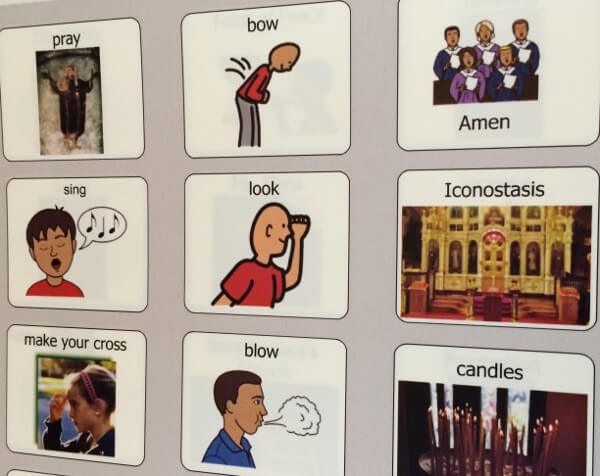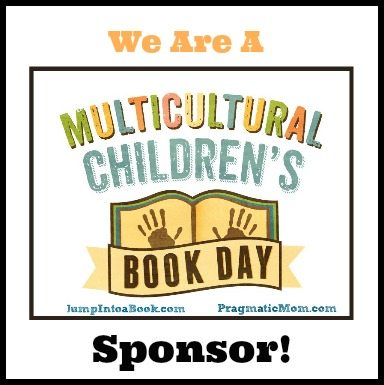Guest post by Summer Kinard
A Boy Who Could Sing Holy
We are all born with the seed of the Logos in us. When we are baptized, the seed is watered so that we begin to grow into the likeness of God.
In a nutshell, that’s the way of salvation for Orthodox Christians. We call it theosis, becoming like God. But what happens when the seed of the Logos is watered in a boy who cannot speak, a boy who doesn’t understand that language is a possibility?
When my son Basil turned two, he spoke only four words: agios (holy), ever, it is. He would wake up at the hour of Lauds singing these words ecstatically.
He did not say, “Mama” or “Dada” or “baba” or “shoe.” He was loving and affectionate and playful, but he was in his own world, too. The experts from the state watched him and brought us their results. Extreme cognitive delay, severe language delay. He scored less than the first percentile in his understanding of language.
We received this news about our son with hope, because I knew that even so, someone had taught him to sing in the night. A boy who could sing, “holy” could say what needed to be said.
Visual Language for a Nonverbal Child
After a couple of months of evaluations and waiting, we began early intervention speech and occupational therapy with our boy. His speech therapist, in a moment of intuition for which I thank God, turned to me and asked if we would consider a visual language system for Basil. She had the impression that he had words and ideas in his mind but no way to filter them into language.
I surprised her with the eagerness of my “yes.” I was shocked that everyone did not jump at the chance to teach a nonverbal child with pictures. Of course, he would need images. They have always gone together, holy words and songs and icons. Why would everyday language of sunshine, cars, and breakfast be different?
We began to learn the PODD (Pragmatic Organisation Dynamic Display) assisted language system over the summer. Basil’s understanding and interaction with us sprang up at an amazing rate. Little by little, we’re making progress communicating.
Words and Images
In church, we bring along a few pages of the PODD to talk Basil through the parts of the Liturgy he’s able to process. I point to the pictures and speak disjointed sentences. They’re made of actions and objects and rely on our relationship to make sense. I point to the words, flipping pages as I speak into his ear.
“Kiss.” “Icons.” “Jesus.”
“I like this.”
“I like Feast of Peace.”
“Time to Go, Go, Go to Feast of Peace.”
“Your turn.”
“Your turn for Feast of Peace.”
“I like Feast of Peace.”
“It’s good.”
“Basil is happy.”
“We love Basil.”
“Mama loves Basil. Jesus loves Basil.”
“Kiss Basil. Jesus kiss Basil.”
“I like this.”
I stand in line for the holy mysteries, holding a plump toddler whose eyes glow with anticipation while I jab at truth in whispers. My mind reaches back fifteen years to complete the circle of meaning. I studied biblical Hebrew in seminary, and I read the creation story for the first time. “And God said, “Be light and light is,” though the English cannot capture the simplicity of the original language. “Light!” and “Light.” The act of saying it makes it so because of the one who says it.
I whisper irreverently all the way through the communion line, teaching my boy in pictures and actions the relationship between God and man. I hope that between my gestures and words and Basil’s ears, that the creative Logos of God will take over and make something real.
More Than Words
When we talk about the Logos, we usually try to talk about reason. But Logos is more than reason. Logos makes no sense without relationship. Logos is what makes light and lets us see. Logos turns a tired mother, pointing to cartoon pictures in the communion line, into a teacher. Logos gives a mouth to a little boy without words. He opens that little mouth and receives the Logos of God.
Logos forms my son through the icons that he kisses and the songs that shape his heart and the hugs of his family. I see Basil growing, not only in his facility with language, but in his relationship with us.
The Greek Orthodox Archdiocese recently decided not to translate Logos into English. It’s too easy in English to reduce Logos into “word” or “reason” or “mind.” It’s too easy to rely on what we can grasp about those words, and it’s too easy to exclude those who cannot grasp words, or reason, or whose minds are different. But I suspect the reason they decided not to translate Logos goes deeper.
Logos has grown up in a Church filled with words and people and holy images. It cannot be separated from the holy Church or the witness of the icons to the Incarnation. We were never able to know the Logos until He became flesh and dwelt among us.
That’s where I see the Logos growing in my boy. The Logos of God is relationship, not vocabulary. In stilted, simple language, we are limping toward meaning, all the while becoming more and more like God.
“Let’s go, go, go to Feast of Peace.”
“Jesus kiss Basil.”
“Basil kiss Jesus.”
“Jesus with Basil.”
“Jesus loves Basil.”
“I like this.”
About Summer Kinard
Summer is a Greek Orthodox Christian, the mother of five autistic children, a tea lover, classically trained soprano, and author of inspiring novels and curricula for active learners. She writes about the practicalities of autistic and spiritual life on her Facebook page and on her website. She’s currently writing Of Such is the Kingdom: A Practical Theology of Disability, a book that will show a way of welcoming persons and families with disabilities into the Orthodox Christian Church that is grounded in the heart of God.
Read More
Loving an Autistic Child at Church: How do you help an autistic child in your parish stay in the church as he grows up? It only takes one thing: Love.
The best picture books with disabled characters: These books allow children with disabilities the joy of seeing themselves in books. And they allow children who don’t have disabilities to get familiar with disabilities.
Disability and special needs: People sometimes feel uncomfortable around people with disabilities. It doesn’t have to be that way. These tips can help you welcome everyone to your church.
Buy the Books!
Catherine’s Pascha
FINALIST IN THE 2015 USA BEST BOOK AWARDS
Catherine doesn’t like vegetables. She doesn’t like naps. She doesn’t like it when her mom combs her hair. She loves hot dogs, chocolate cake, and her best friend, Elizabeth. Most of all, she loves Pascha! Pascha, the Orthodox Christian Easter, is celebrated in the middle of the night, with processions and candles and bells and singing. And Catherine insists that she’s not a bit sleepy.
Celebrate the joy of Pascha through the magic of a book: Catherine’s Pascha. Available on Amazon, Bookshop.org, and my webstore.
The Saint Nicholas Day Snow
Shoes or stockings? Horse or sleigh? Does St. Nicholas visit on December 6 or on Christmas Eve? Will a little girl’s prayer be answered? When Elizabeth has to stay at Catherine’s house, she’s worried about her grandmother, and worried that St. Nicholas won’t find her. The grownups, though, are worried about snow.
Celebrate the wonder of St. Nicholas Day through the magic of a book: The Saint Nicholas Day Snow. Available on Amazon, Bookshop.org, or my webstore.




